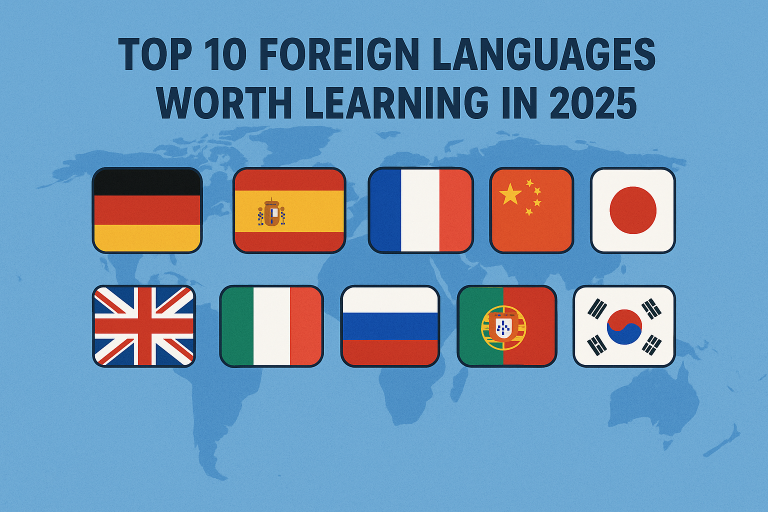The ability to communicate in multiple languages is no longer just an impressive skill — it’s a gateway to personal transformation and global opportunity. As we enter 2025, the importance of learning a new language has never been greater. The world is more interconnected, industries are more globalized, and employers increasingly seek individuals who can bridge cultural and linguistic gaps.
But with thousands of languages out there, which ones should you focus on? Here’s a look at the 10 most valuable foreign languages to learn in 2025, each with its own unique benefits and reasons to consider.
1. Mandarin Chinese – The Language of Economic Giants
With over a billion native speakers, Mandarin Chinese reigns as the most spoken language on the planet. China remains a driving force in global trade, manufacturing, and innovation, making Mandarin an essential language for professionals in finance, tech, logistics, and international business.
Though it can be challenging due to its tonal nature and character-based writing system, mastering Mandarin opens up rich cultural experiences and powerful business prospects across Asia and beyond.
2. Spanish – A Global Communication Powerhouse
Spanish isn’t just useful — it’s nearly everywhere. Spoken across Europe, Latin America, and the U.S., Spanish offers access to diverse markets, vibrant cultures, and growing economies.
Whether you’re traveling, working in healthcare, education, or international trade, or simply want to engage with half a billion speakers, Spanish remains a smart and accessible choice — especially for English speakers, given the similarities between the two languages.
3. French – Timeless, Elegant, and Global
French might be seen by some as a language of art and romance, but its global relevance is undeniable. With a strong presence in Africa, Europe, the Caribbean, and Canada, French is spoken by more than 300 million people worldwide.
It’s also the working language of several global organizations, including the UN and Red Cross. For those interested in diplomacy, international law, or cultural pursuits, French remains one of the most rewarding languages to learn in 2025.
4. German – The Key to European Industry and Innovation
Germany continues to dominate European economics and engineering. As the native language of over 100 million people and a critical language in science, research, and manufacturing, German opens doors in sectors like automotive design, renewable energy, and pharmaceuticals.
While its grammar may be tough at first glance, German’s structure and logic can become second nature with consistent practice — and its career benefits are undeniable.
5. Japanese – Tech, Tradition, and Cultural Fascination
Japan remains a global force in robotics, design, and high-end technology. Japanese is the language of a nation that blends centuries-old traditions with futuristic innovation. Learning Japanese not only improves your career prospects in tech, research, and manufacturing but also connects you to a world of anime, J-pop, martial arts, and culinary art.
Though its writing systems (Hiragana, Katakana, and Kanji) can seem intimidating, learners often find the effort deeply rewarding.
6. Arabic – A Language of Rich Culture and Emerging Influence
Arabic spans more than 25 nations across the Middle East and North Africa. It’s a language steeped in history, religion, and philosophy, and it’s becoming increasingly relevant in modern business and politics.
Fluency in Arabic gives you access to booming industries in the Gulf, humanitarian work across developing regions, and insights into one of the world’s most complex and diverse cultures. Learning Arabic isn’t easy due to its script and dialects, but it certainly pays off for those committed.
7. Portuguese – Brazil’s Language and Beyond
Portuguese is spoken not just in Portugal but also in Brazil, Angola, Mozambique, and several other nations. As Brazil emerges as a major player in the energy, agriculture, and digital sectors, the value of Portuguese rises alongside it.
Its melodic sound and familiar structure (especially for Spanish or French speakers) make Portuguese relatively approachable, and its growing influence makes it a strategic choice for global thinkers.
8. Korean – At the Heart of Pop Culture and Tech
Korean has captured the world’s attention, thanks to its powerhouse entertainment industry. From K-dramas to K-pop to internationally respected tech brands like Samsung and LG, South Korea plays a central role in modern culture and innovation.
Learning Korean can enrich your understanding of these cultural exports while also providing career opportunities in one of Asia’s most dynamic economies. Plus, Hangul — the Korean alphabet — is known for being one of the most logical and easy-to-learn writing systems.
9. Russian – Language of Strategy and Science
Despite political complexities, Russian remains highly relevant on the global stage. It’s spoken across Russia and large parts of Eastern Europe and Central Asia. It’s also widely used in fields like cybersecurity, space exploration, and energy.
For those involved in intelligence, diplomacy, or scientific research, Russian is a powerful language to have under your belt. Its Cyrillic script and grammatical structure may be a challenge, but the influence and reach it offers are substantial.
10. Hindi – The Language of Emerging India
India is fast becoming a global superpower, especially in IT, pharmaceuticals, and space tech. Hindi is one of its most widely spoken languages and offers access to the lives and minds of over 600 million people.
Learning Hindi can be an asset for global businesses, cultural exploration, and understanding the Indian market — one of the largest and youngest populations in the world. Plus, it introduces you to a diverse literary, musical, and spiritual heritage.
Why 2025 Is the Perfect Time to Learn a New Language
There’s never been a more exciting or necessary time to pick up a new language. In 2025, the world feels smaller than ever—remote work has gone mainstream, digital nomads are building lives across continents, and international companies are seeking talent that can navigate cultural and linguistic boundaries with ease.
Sure, translation apps and AI tools can help in a pinch, but they fall short when it comes to human connection. They miss the subtle cues, the humor, the emotion—the heart of real communication. Learning a language yourself brings depth and authenticity that no software ever could.
And beyond communication, language learning is a powerful brain workout. It enhances focus, boosts memory, strengthens problem-solving skills, and even helps protect against age-related cognitive decline. It’s a gift to both your mind and your future.
Choosing a Language That Matches Your Vision
Before diving into vocabulary lists and grammar exercises, take a moment to look inward. The best language for you isn’t necessarily the trendiest—it’s the one that aligns with your lifestyle, passions, and goals.
Ask yourself:
- Where do I see myself working or living in the next few years?
- What professional fields am I drawn to?
- Are there cultures I feel inspired by or emotionally connected to?
- How much time can I realistically dedicate to learning a language?
Some languages may unlock new career doors. Others might allow you to explore a culture you’ve always loved. Whether it’s strategic or sentimental, make the choice that feels right for you.
Conclusion
Language is more than a means of communication—it’s a passport to understanding. It connects you to people, ideas, and perspectives you might never access otherwise. In a world craving connection, learning a new language is a powerful way to bridge divides and grow as a person.




